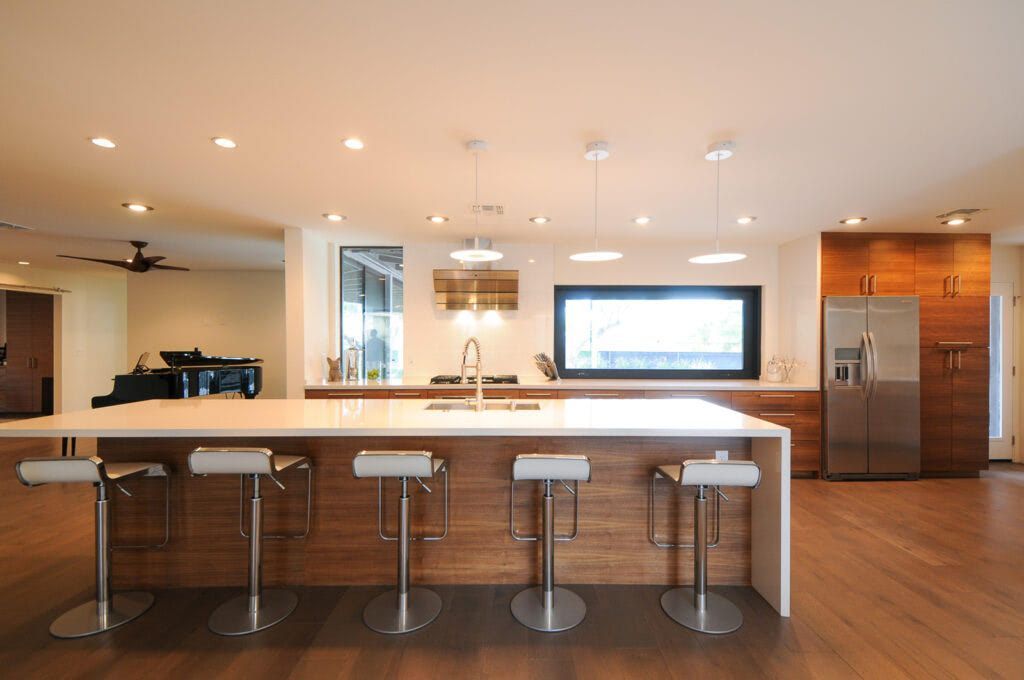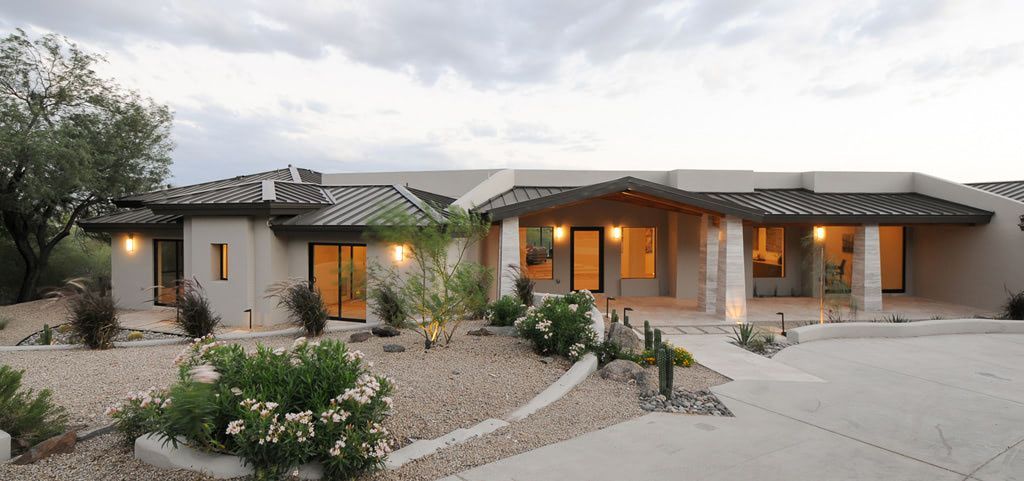Imagine stepping into a home that brings your vision to life—a space where every detail reflects your style and needs. This is the unique allure of building a custom home.
And while the journey is exciting, you might also be nervous thanks to ‘horror’ stories about unexpected delays or challenges.
The truth is custom home building does take time—anywhere from 16 to 24 months is normal for Arizona.
But it’s far from a horror show. With the right team and approach, those 16 to 24 months should be filled with anticipation and excitement.
Even when unavoidable delays happen, you should always feel like your project is in good hands. A skilled builder will guide you through every step, making sure that even the unexpected is handled smoothly, keeping your vision on track.
In this blog post, we will demystify the custom home construction timeline, offering you a clear roadmap from the first spark of inspiration to the moment you turn the key in your dream home.
How Long Does it Take to Build a Custom Home?
When building a custom home, the timeline depends on factors such as the size and complexity of your design, site conditions, and the coordination of your team.
For most custom homes, the entire process typically takes between 16 to 24 months.
From the moment you begin working with professionals to design your dream home to the final inspections, every stage is an opportunity to create something uniquely yours.
Each step requires careful attention to detail, ensuring that the end result is nothing short of perfection—a home built to your exact vision.
Phase-by-Phase Breakdown: Understanding Your Custom Home Timeline
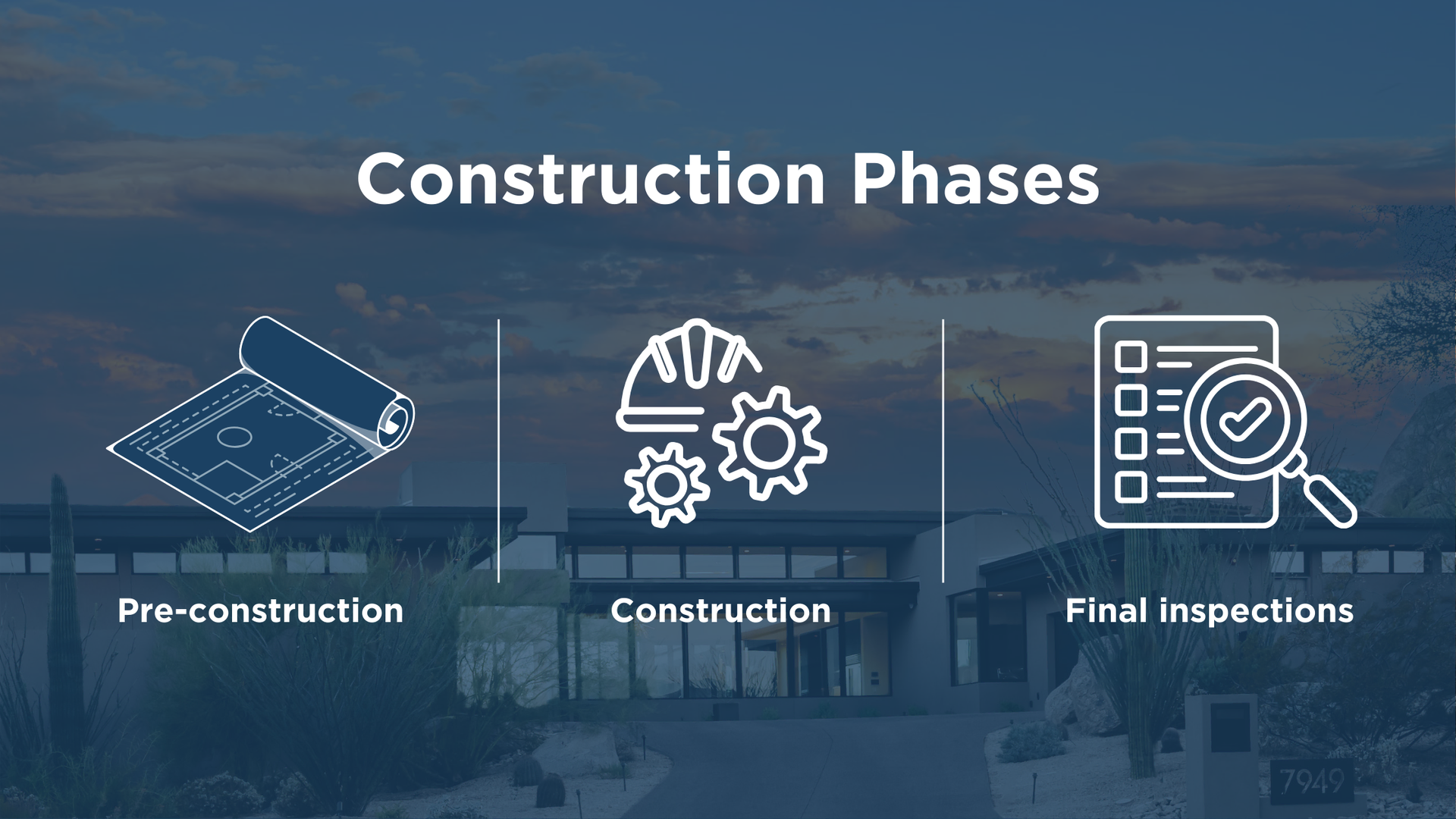
Building a custom home is a step-by-step journey, with each phase bringing you closer to your dream home. While each stage has its own set of tasks, understanding what’s involved helps you stay prepared and excited about the next step.
Assuming you already own the property, here’s a clear breakdown of the timeline, so you know what to expect at each phase.
1. Pre-construction phase:
This phase is where your vision begins to take shape. It involves everything from conceptualizing your home design to working with architects, engineers, and securing necessary permits.
Typically, this process takes 4 to 12 months, depending on the complexity of your project and the local permitting process.
In growing areas like Phoenix, permits may take up to 6 months, but with our expertise, we help streamline this process to keep things moving smoothly.
If your property is part of a homeowners’ association (HOA), we'll handle the approval process before submitting your plans to the city. Although this can extend timelines slightly, having a team that knows how to navigate these steps efficiently helps minimize any delays.
During this time, we also create a detailed budget and schedule, collaborating with trades to ensure everything—from material sourcing to labor coordination—is planned out early. This careful preparation helps avoid surprises and keeps the build process on track.
2. Construction phase
Once the pre-construction phase is complete, the excitement of building begins. This stage includes site preparation, foundation work, framing, and installing systems and finishes.
Typically, the construction phase takes 8 to 18 months, depending on the scope of the project.
Arizona’s dry climate is generally a great advantage, helping to minimize weather-related delays. While occasional site-specific challenges or HOA restrictions may arise, our team is experienced in navigating these to keep your project moving forward efficiently.
3. Final inspections and completion
As construction wraps up, a final inspection ensures that everything meets the highest building codes and standards. Any remaining tasks or touch-ups are addressed, followed by a thorough clean-up of the property to get it ready for your review.
Once everything is in perfect order, you'll have the chance to walk through your new home for final sign-off. After that, the keys are yours, and you can begin enjoying the custom home you've worked hard to create.
With proper planning and close collaboration with your builder, this final phase goes smoothly, making the transition into your new home both seamless and exciting.
The Best Time to Hire a Custom Home Builder: Timing is Everything
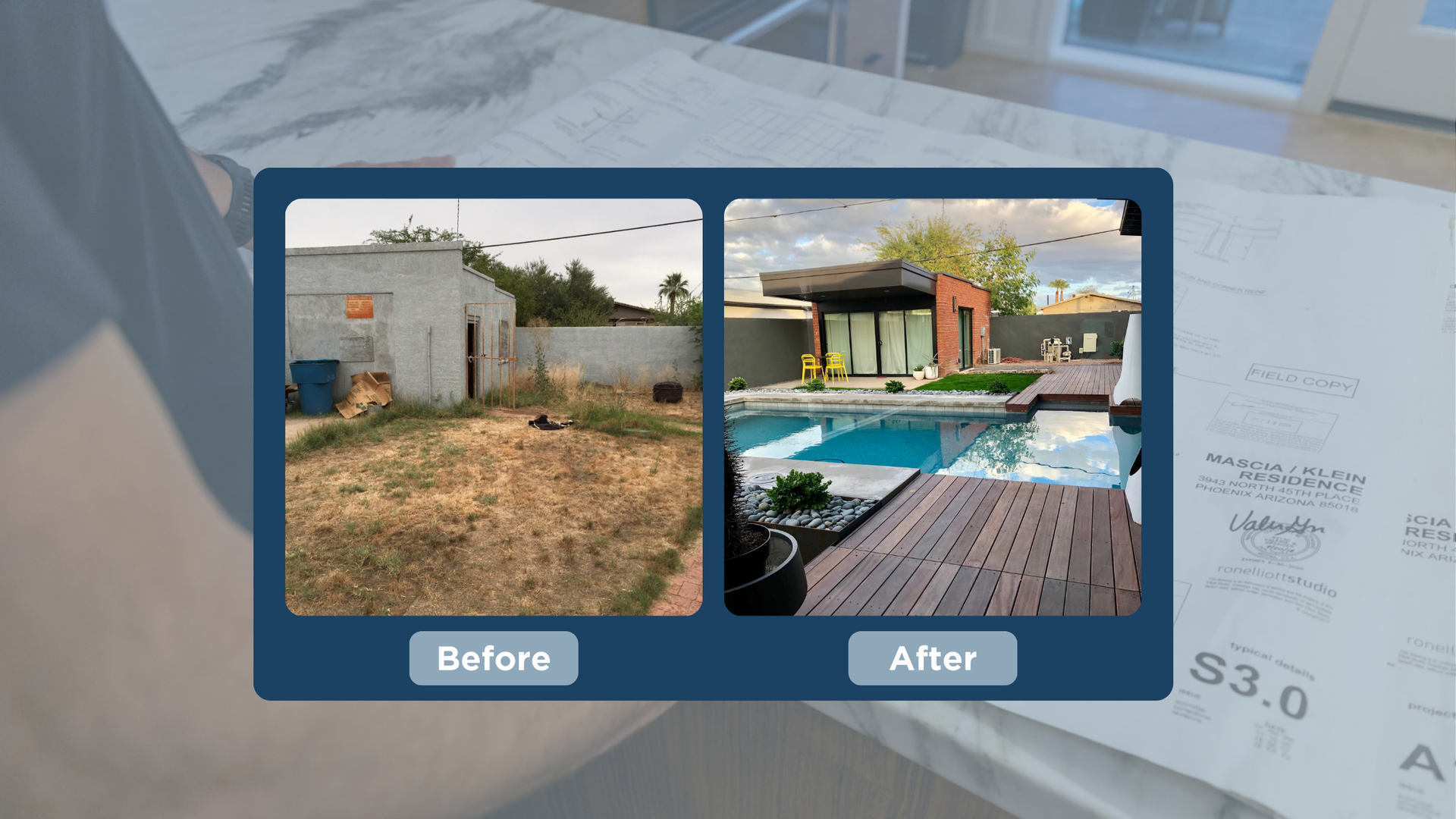
Choosing the right time to hire your custom home builder is key to the success of your project.
Ideally, involving your builder early in the process—before you even purchase the land—can help confirm ideal conditions and uncover any potential issues before they become costly surprises.
Choosing a Builder Before or After the Architect: What’s Best?
Many people ask who to hire first, the builder or the architect. At Collective Construction, we believe the builder should be the first point of contact.
While both approaches have their merits, hiring a builder first can provide significant advantages. A builder can collaborate with the architect from the beginning, influencing the design in ways that optimize construction efficiency and cost-effectiveness.
Common Delays in the Custom Home Building Process and How to Avoid Them
Even with the best planning, unexpected delays can arise during the custom home building process. These delays can be frustrating and costly, but understanding their common causes can help you avoid them or be prepared to minimize their impact.
Delay 1: Indecision and Last-Minute Changes
Indecision and last-minute changes to the design are the biggest and most common cause of delays. These changes can disrupt the flow of construction, causing significant setbacks.
When homeowners frequently change their minds or delay decisions, it creates a domino effect, pushing back schedules and increasing costs.
This can be particularly problematic if decisions are delayed during critical phases like electrical or plumbing installations, where alterations may require rework and additional inspections.
Tip to Avoid Indecision Delays
It’s crucial to make all key design decisions early in the process to ensure a smooth build. Early decisions help avoid delays and keep the project on track.
However, it’s also okay to make changes along the way—nothing is completely set in stone. The key is making these adjustments in a timely manner to prevent disruptions.
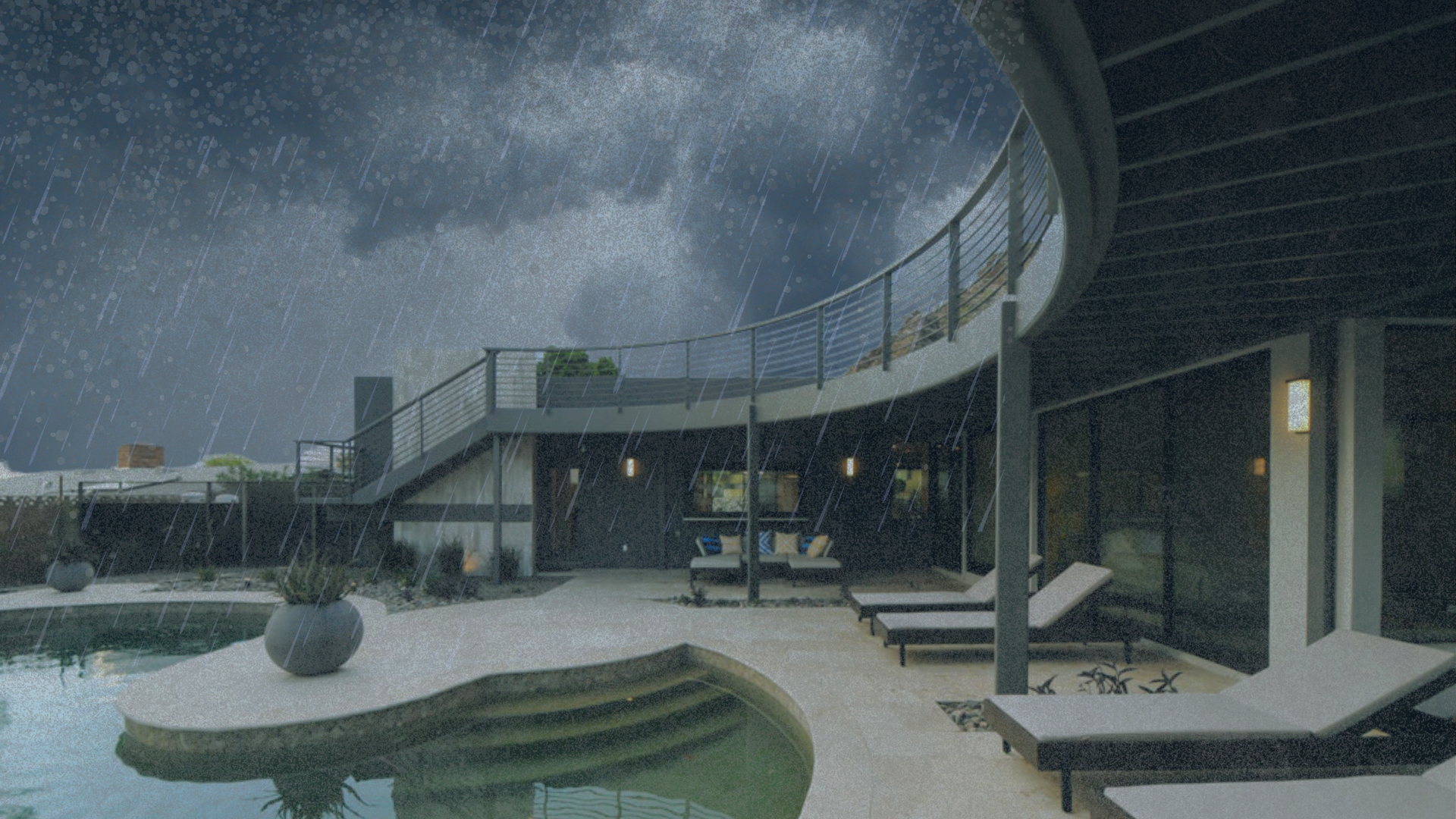
Delay 2: Permitting Snags
Securing building permits is an important step in the custom home-building process, and while it can take time, it doesn’t have to be a significant hurdle. With the right team managing the process, you can navigate it smoothly.
In Arizona, particularly in growing cities like Phoenix, permit approval can take several months due to high building demand, but with proactive planning, we can help keep your project on track.
Before submitting your plans to the city, it’s important to get approval from your HOA (Homeowners' Association). The HOA often has specific design rules that could affect how your home is built.
Once approved, your local city officials will review your plans to ensure your home meets safety and structural standards.
Tip to Avoid Permitting Delays
To prevent permitting delays, your builder should carefully review all plans and ensure they meet engineering requirements before submitting for approval. This way, everything aligns with both HOA design guidelines and the city's safety standards from the start.
By working closely with your builder and architect during this phase, any potential issues can be caught early, helping the approval process move forward smoothly and keeping your project on track.
"If you’re looking for durability and quality more than anything, it’s often best to select your builder first so they can help develop the team and guide the project from the ground up."
– Matt Lamb, Founder of Collective Construction
"Losing momentum because of indecision is a serious risk. When a project stalls, it can be very difficult to get back on track, causing weeks of delays."
– Matt Lamb, Founder of Collective Construction
"A good builder will anticipate potential issues and address them proactively, reducing the likelihood of failed inspections and keeping the project on schedule."
– Matt Lamb, Founder of Collective Construction
Preparation is key to passing inspections on the first try.
At Collective Construction, we ensure that all aspects of your project meet local building codes and standards before scheduling any inspections. We are always on-site during inspections, along with our trades, to quickly address any feedback or minor fixes on the spot to maintain momentum.
Keeping the project moving is crucial to staying on schedule, so we carefully plan inspections for the end of the week, giving us the weekend or an extra day to make any necessary adjustments.
However, our primary goal is to complete everything properly before inspections to avoid delays and ensure smooth approval.
A Quality Home Builder: The Key to a Smooth Custom Home Build
Looking to avoid all of these delays in one swoop? The key lies in proper and thorough planning, and that’s most effectively achieved by choosing a high-quality home builder. Whether you’re building a desert retreat or a modern home in the Phoenix area, your choice of builder makes all the difference.
The more detailed your planning in the early stages, the fewer surprises you’ll face during construction. This includes finalizing your design, securing permits, and ordering materials.
Proper planning will help you maintain momentum throughout the construction process with timely decision-making, clear communication, and consistent follow-through.
A high-quality builder is essential in guiding you through your design and construction project. They will handle much of this planning for you, ensuring that all aspects of your custom home build are meticulously managed from start to finish.
Building Your Dream Home in Arizona: A Timeline You Can Trust
Now that you have a clearer understanding of the timeline for building a custom home in Arizona, from the initial design phase to the final inspection, we hope some of the stress you might have been feeling has eased.
With the right builder, the time to build your dream home should be filled with excitement and anticipation—not stress or uncertainty.
At Collective Construction, we believe that building your dream home is an experience to enjoy, and we’re here to ensure the process stays on track, predictable, and as smooth as possible. Our experienced team manages each phase with care, so you can focus on watching your vision come to life, knowing your project is in capable hands.
With careful planning and expert guidance, the timeline for building a custom home becomes an exciting journey—one that’s about crafting something truly unique, tailored just for you.
Ready to begin this journey?
Apply for a free consultation
with Collective Construction today, and let's make your dream home a reality.
By maintaining regular communication with your builder and architect and conducting walkthroughs, you can ensure your vision is realized while keeping any changes or adjustments from causing setbacks.
Early collaboration with your builder, architect, and designer is essential for a smooth building process.
A cohesive team can anticipate challenges, plan for them, and reduce the likelihood of delays. This collaborative approach also helps in refining your design choices, managing your budget effectively, and ensuring that the construction process stays on track.
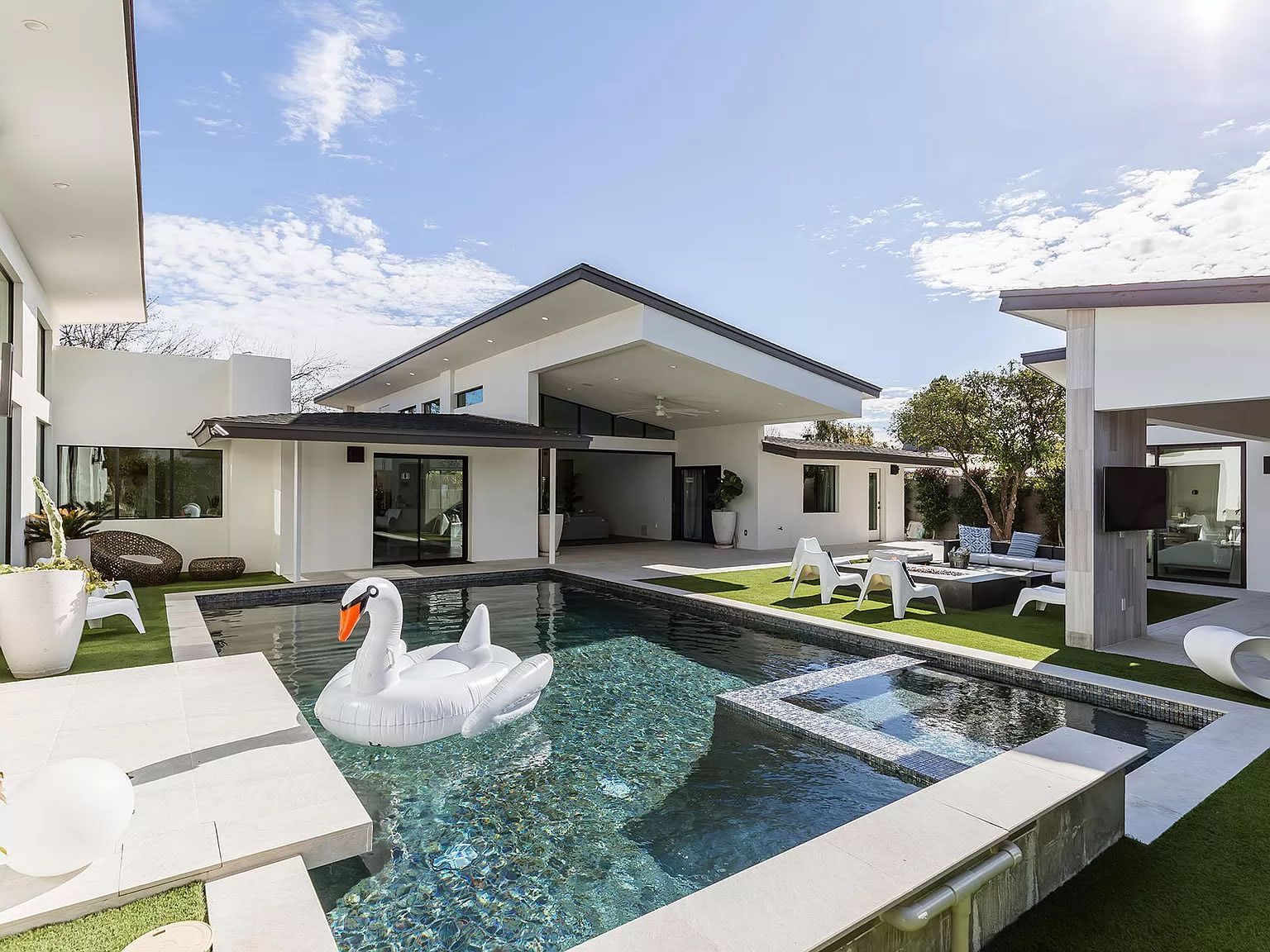
Delay 5: Inspection and Approvals
Inspections are an essential part of the construction process to ensure everything meets code requirements and high safety standards.
While inspections are routine, addressing any issues promptly ensures the project stays on track, preventing costly or time-consuming delays.
Tip to Avoid Inspection Delays
To mitigate potential supply chain delays, it’s essential to hire a builder with experience and a strong network. A quality builder will order materials well in advance and work closely with reliable suppliers, ensuring your project stays on track.
A well-connected builder also has access to trusted subcontractors and can source alternative products if needed.
Being flexible with material selections and having backup options in place can further help avoid disruptions.
Lastly, remember that even the best of builders experience situations out of their control. A 2021 study by the NAHB found that over 90% of builders experienced delays due to supply chain issues.
While even the best builders may encounter unforeseen challenges, a great builder will be transparent, keeping you informed and proactively addressing any delays.
With open communication and thoughtful planning, these challenges can be managed without compromising the progress of your dream home.
Delay 3: Supply Chain & Labor Disruptions
Supply chain disruptions are increasingly common and can cause significant delays if critical materials are not available when needed.
According to the 2022 Survey of Construction (SOC) from the Census Bureau, the average completion time for a single-family home increased to approximately 9.6 months—nearly six weeks longer than in 2021—due to ongoing supply-side challenges and skilled-labor shortages.
Tip to Avoid Supply Chain Delays
Delay 4: Weather Events
Weather conditions can occasionally affect your construction timeline, but Arizona’s dry climate is typically a great advantage.
With limited rain or snow, major weather delays are rare. However, even smaller weather events can cause minor disruptions.
Tip to Avoid Delays Due to Weather
While you can’t control the weather, you can certainly plan for it. Building a small contingency into your project timeline for weather-related delays helps ensure your overall schedule stays on track.
By anticipating potential disruptions and adjusting the schedule as needed, you can manage expectations and keep the project moving forward.
Your builder will also regularly monitor weather forecasts and plan key construction activities during favorable conditions to minimize any impact from unexpected weather events.
Office
15333 N Pima Road, Suite 305, Scottsdale, AZ 85260
